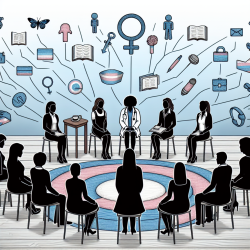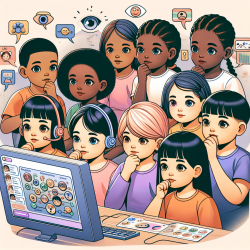Introduction
The recent study titled "Transgender and Gender Diverse Community Connection, Help-Seeking, and Mental Health Among Black Transgender Women Who Have Survived Violence: A Mixed-Methods Analysis" offers critical insights into the intersection of community connection and mental health outcomes for Black transgender women. This blog aims to distill the findings for practitioners in speech-language pathology and other related fields, focusing on how these insights can be leveraged to improve therapeutic outcomes.
Understanding the Context
Black transgender women face unique challenges due to the intersection of racial and gender-based discrimination. This demographic is disproportionately affected by violence, which significantly impacts their mental health, often leading to conditions such as depression and PTSD. The study highlights the role of Transgender and Gender Diverse (TGD) community connection as a potential buffer against these adverse outcomes.
Key Findings
- Community Connection: Emotional and behavioral connections within the TGD community are linked to improved mental health outcomes. The study found that these connections can mitigate the negative impacts of violence on mental health.
- Help-Seeking Behavior: TGD community connection was found to influence help-seeking behaviors positively. Black transgender women with strong community ties were more likely to seek and receive appropriate support following violent experiences.
- Mental Health Outcomes: The presence of a supportive community was associated with reduced symptoms of depression and PTSD, emphasizing the importance of community in therapeutic settings.
Implications for Practitioners
For practitioners, these findings underscore the importance of fostering a sense of community and belonging in therapeutic settings. Here are some actionable strategies:
- Encourage Community Engagement: Facilitate connections between clients and supportive community networks. This can be achieved by providing information about local TGD community groups and events.
- Create Inclusive Spaces: Ensure that therapy environments are inclusive and affirming of all gender identities. This can help clients feel safe and supported, encouraging open communication and engagement.
- Integrate Community Resources: Collaborate with community organizations to provide holistic support that addresses both mental health and social needs.
Encouraging Further Research
The study highlights the need for longitudinal research to better understand how TGD community connections can be leveraged to improve mental health outcomes. Practitioners are encouraged to contribute to this body of research by documenting and sharing their experiences and outcomes.
Conclusion
By integrating community connection strategies into therapeutic practices, practitioners can enhance the support provided to Black transgender women, ultimately leading to better mental health outcomes. This approach not only addresses the immediate needs of clients but also contributes to the broader goal of reducing health disparities within this community.
To read the original research paper, please follow this link: Transgender and Gender Diverse Community Connection, Help-Seeking, and Mental Health Among Black Transgender Women Who Have Survived Violence: A Mixed-Methods Analysis.










